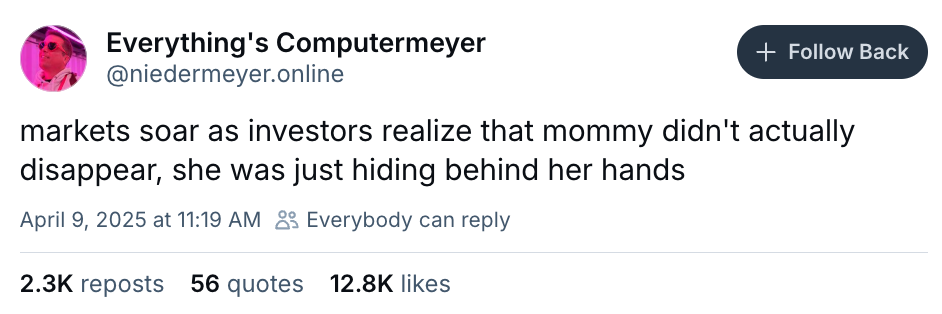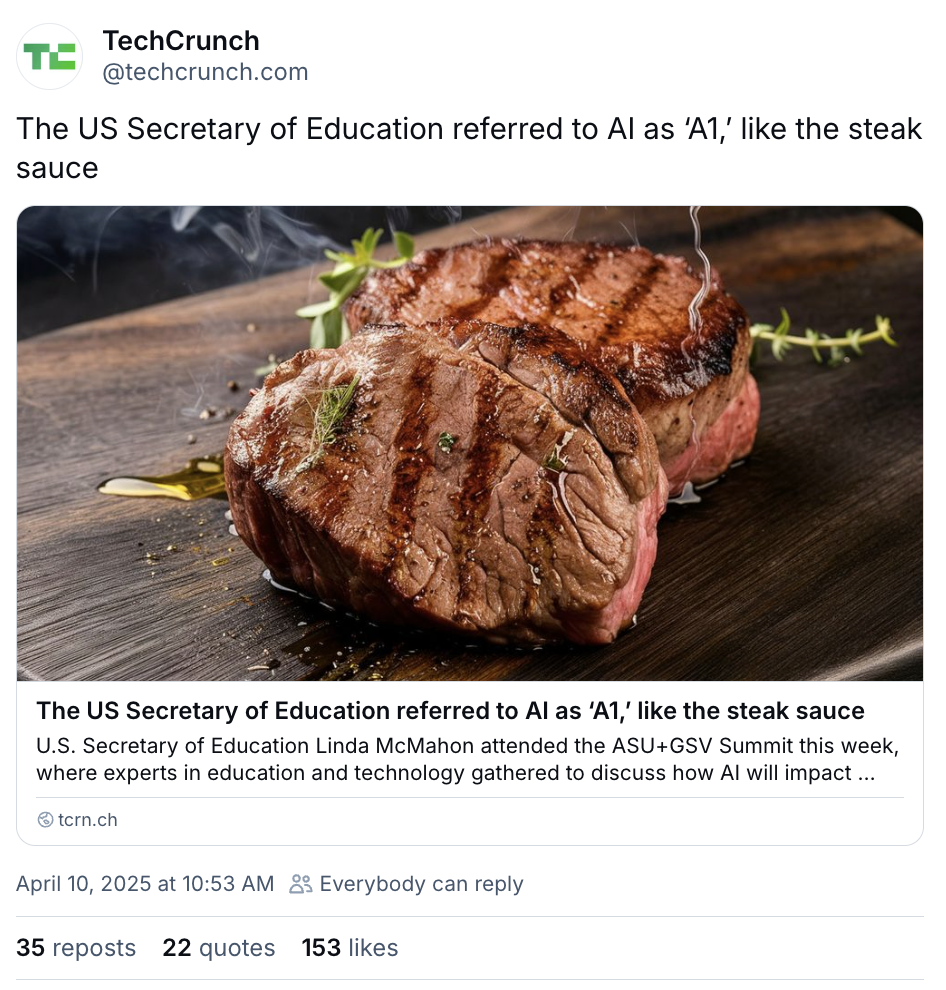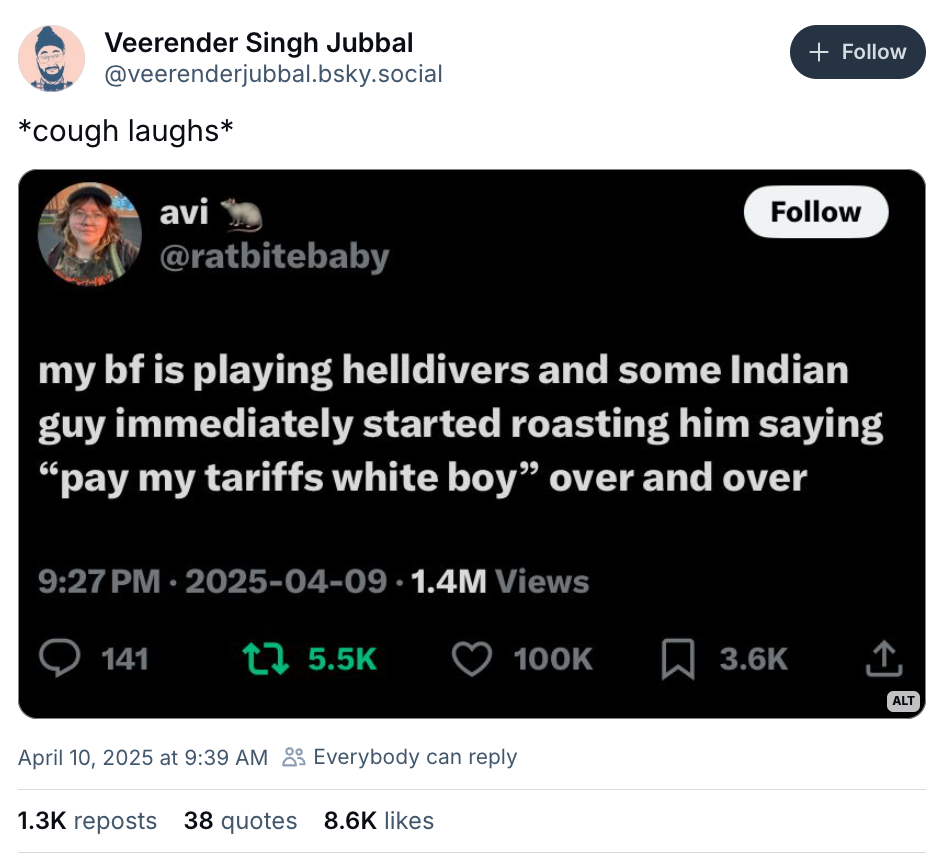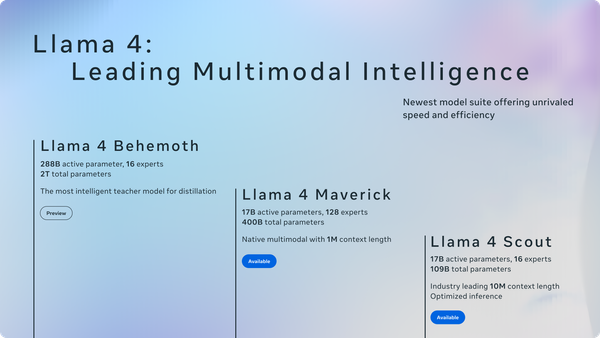The platforms cash in their chips with Trump
From Meta to Nvidia, tech CEOs are paying the president to get the outcomes they want — and it's working

I.
On Monday, the Federal Trade Commission’s landmark antitrust lawsuit against Meta is scheduled to go to trial in Washington, DC. The lawsuit, which was filed during the first Trump Administration, alleges that Meta’s acquisitions of Instagram and WhatsApp were illegal and should be undone. While a breakup is seen as unlikely, it remains a significant threat to Meta’s business.
Under normal circumstances, we would expect this trial to be determined by what happens in the courtroom. But as the chaos that has unfolded in the financial markets over tariffs this week has shown, circumstances in Washington these days are anything but normal.
What if, instead of the courtroom, Meta’s fate was decided in the White House? Meta has been working to ensure that is the case since shortly after Trump won a second term. CEO Mark Zuckerberg has spent time with the president at Mar-a-Lago and cohosted a reception for his inaugural. The company donated $1 million to the inauguration, and spent another $25 million to settle a baseless lawsuit that Trump filed in 2021 in response to Meta suspending his account in the wake of his attempt to overthrow the government.
Meanwhile, Trump fired the two Democratic FTC commissioners, who surely would have opposed any effort to bring the trial to a premature end. That appears to be illegal, but they won’t be restored to their positions unless a court rules in their favor.
Last summer, Trump was musing openly about putting Zuckerberg into prison. But once the payments began to roll in, the president’s treatment of Meta improved substantially. In February, Trump warned that he would implement tariffs partially in retaliation for European fines against US tech companies including Meta, saying that America had become a victim of “overseas extortion and unfair fines and penalties.” “They’re suing Google, they’re suing Facebook, they’re suing all of these companies, and they’re taking billions of dollars out of American companies,” Trump said last month.
These sentiments, which match Zuckerberg’s public comments, have had the desired effect. In March, the Financial Times reported that the European Union planned to levy lower-than-expected fines in an effort to avoid Trump’s wrath. (On the other hand, the EU is now readying new digital taxes against Meta and other US tech companies in retaliation for Trump’s now-paused tariffs.)
Zuckerberg’s former growth chief at Facebook, Chamath Palihapitiya, helpfully explained the current dynamic in a podcast discussion posted on X this week.
“I was a megadonor to the Democrats,” said Palihapitiya, now himself a billionaire and the founder of Social Capital. “I couldn't get a phone call returned from the White House to save my life … The Trump administration is totally different. There's not a single person there you can't get on the phone and talk to.”
When Zuckerberg calls on Trump to force a quick settlement of the FTC case, will the president answer?
A year ago, it seemed unthinkable. Today it seems much less so.
II.
Most people’s attention this week has been justly fixed on Trump’s tariffs, which briefly cratered the stock market based on the administration’s disastrous misunderstanding of the global economy. After the stock exchanges began to plunge, the president declared a 90-day pause on tariffs higher than 10 percent. (The exception is China, where he increased tariffs even higher, to 145 percent.)
The tariffs shocked even close observers of Trump, who had expected them to be smaller and more considered. They surely galled the oligarchs who lined up to support Trump after the election even more: this was not the laissez-faire corporate tax cutter of the first administration, but something more misinformed and deranged. (To be clear, this more erratic version of Trump was visible to anyone who watched him give a campaign speech last year, but the billionaires chose to see what they wanted to see.)
But I want to highlight one particular story from the period leading up to the tariffs, which highlights the way that the open corruption of Trump’s pay-to-play Washington has undermined the administration’s own agenda.
If there is any current of thought in Trump’s policies that has remained relatively stable from one administration to the next, it’s a hawkish stance toward China. In his first term, Trump began to place tariffs on Chinese goods and put Chinese companies including Huawei on a trade blacklist. That blacklist, which eventually grew to include DJI and ZTE, originated over fears that the technology posed national security risks to the United States. (Imagine if Huawei had installed a backdoor in the nation’s 5G infrastructure to enable Chinese spying, for example.)
Over time, though, the blacklist came to serve an additional purpose: preventing China from getting access to the technology necessary to build advanced artificial intelligence. In December 2020, at the end of Trump’s first term, he added an important Chinese semiconductor manufacturer named SMIC to the US entity list, preventing US companies from selling advanced chipmaking technology to it.
Biden dramatically expanded those export controls beginning in 2022; he added to them in each of the next two years. The administration stated explicitly that the goal was to prevent China from building advanced AI systems for military use.
Judging from comments that Trump and Vice President J.D. Vance have made in recent months, the Trump administration understands very little about AI and the national security risks that it poses to the United States. What the administration knows is that it wants to “win,” and that to “win” means to beat China in building highly capable systems. On his first day in office, Trump issued a memorandum endorsing Biden’s export controls and instructing the secretaries of State and Commerce to expand them.
III.
Then last week, at a cost of $1 million, Nvidia CEO Jensen Huang visited Mar-a-Lago for dinner. Since January, the Trump administration has been considering whether to place further restrictions on which chips Nvidia can sell to China.
In particular, Trump officials have been discussing whether to restrict the sale of the H20.
The H20 is a modified version of Nvidia’s higher-end chips designed to comply with the export controls introduced during the Biden Administration. The idea was to hamper Chinese AI labs’ ability to compete with top American companies.
Then DeepSeek happened. The Chinese company released its high-quality, low-cost open source R1 models, and demand for the H20 exploded. Earlier this month, The Information reported that Chinese firms had placed at least $16 billion in orders for the H20, hoping to capitalize on its ability to train and run AI systems. And around the same time, the Trump administration began to consider adding the H20 to the list of chips that Nvidia can’t sell in China.
This put Huang in a dilemma. If he could manufacture the chips and ship them to China before export controls went into effect, his firm would generate another $16 billion in revenue. On the other hand, if the ban came down before the chips were ready, he would have to find a new buyer.
With so many billions on the line then, it only made sense to spend a single million for the chance to make his case directly — and so he did.
Here are Emily Feng and Bobby Allyn at NPR:
Following the Mar-a-Lago dinner, the White House reversed course on H20 chips, putting the plan for additional restrictions on hold, according to two sources with knowledge of the plan who were not authorized to speak publicly.
The planned American export controls on the H20 had been in the works for months, according to the two sources, and were ready to be implemented as soon as this week.
The change of course from the White House came after Nvidia promised the Trump administration new U.S. investments in AI data centers, according to one of the sources.
For the moment, then, it seems as if Huang’s million dollars were well spent.
IV.
Perhaps Trump will reverse course here yet again. After all, he reverses course so often in these matters that it almost comes as a surprise when he doesn’t.
But imagine that he stays the course, and what that might mean.
By now it isn’t news that Trump is inconsistent. Increasingly, it isn’t even news that his policies can be bought and paid for. CEOs from Zuckerberg to Huang have eagerly embraced Trump’s policy paywall. There’s a seductive simplicity to the whole thing, if you’re willing to hold your nose.
But it should continue to surprise us just how willing Trump is to undermine himself. It’s a shock to see such a self-styled China hawk slapping the country with the largest tariffs in decades on one hand, while slipping them the chips necessary to build high-end AI systems on the other. And while the H20 seems unlikely to be decisive in China’s ability to catch up to US progress in AI development, the way that Chinese companies are clamoring for it in the wake of DeepSeek’s success suggests it remains extremely valuable.
An openly corrupt president was always going to pose national security risks of one sort or another. The rapid development of powerful AI systems only makes those risks more significant. As Trump and his lieutenants continue to pat themselves on the back for taking such an aggressive stance toward China, we should remember just how easily the president was reportedly persuaded to give the country exactly what it wants.


On the podcast this week: We once again tear up a segment we recorded on Wednesday to bring you an even fresher one about tariffs recorded today. Then, star forecaster Daniel Kokotaljo joins us to discuss his new prediction for how the world might end: AI-2027.com. (A highly recommended weekend read.) Finally, Kevin and I discuss Meta's Llama drama.
Apple | Spotify | Stitcher | Amazon | Google | YouTube

Sponsored

Introducing Augment Agent: a coding Agent for pro software engineers
Augment Code is the first coding assistant built for professional software engineers, large codebases, and production-grade projects.
Now they're excited to unveil Augment Agent, a powerful new mode for Augment Code that can help you complete software development tasks end-to-end. Agent can:
- Add new features spanning multiple files
- Queue up tests in the terminal
- Open Linear tickets, start a pull request
- Start a new branch in GitHub from recent commits
...and all kinds of other things. Skip the toy AI coding projects and build something real – Augment Agent is standing by to help.

More on tariffs
- A look at how creators are scrambling to deal with the consequences of Trump’s tariffs. (Ash Parrish / The Verge)
- The US is largely dependent on Chinese imports – now hit with heavy tariffs – in areas including smartphones, hair for brushes, and gaming consoles, thanks to decades of trade integration. (Bloomberg)
- Apple reportedly chartered cargo flights to ship 600 tons of iPhones to the US from India in an effort to beat the tariffs. (Aditya Kalra, Abhijith Ganapavaram and Munsif Vengattil / Reuters)
- The Nasdaq climbed more than 12 percent after Trump announced the 90-day pause on tariffs. But it was down again today. (Samantha Subin / CNBC)
- Bitcoin spiked more than 7 percent, to $82,305, after the tariff pause was announced. (Tanaya Macheel / CNBC)
- Trump said he told chipmaker TSMC that it would pay up to a 100 percent tax if it didn’t build its plants in the US. (Reuters)

Governing
- Trump signed an executive order directing the DOJ to investigate former CISA director Chris Krebs. Krebs previously rebuked Trump’s baseless claim that the 2020 election was stolen; this EO is yet another terrible abuse of power in an administration is really piling those up. (David DiMolfetta / NextGov/FCW)
- Democratic Sen. Ron Wyden said he will block Trump’s nomination of Sean Plankey as CISA director until the agency agrees to release a 2022 report detailing security flaws across the US telecom network. (Zack Whittaker / TechCrunch)
- USCIS said it will monitor immigrants’ social media for evidence of antisemitic activity, which will be grounds for denying immigration requests. Today in free speech. (Jasmine Garsd / NPR)
- Google will offer major discounts to US federal agencies for its business apps package in an effort to break into a Microsoft-dominant government software market. (Reuters)
- Israeli spyware maker NSO Group – which is on the Commerce Department’s “blacklist”, has hired a new lobbying firm with ties to the Trump administration. (Vas Panagiotopoulos / Wired)
- NSO Group’s spyware Pegasus was used to target 1,223 WhatsApp users in 51 different countries during a hack in 2019. A pretty good reason to keep it on the blacklist!! (Lorenzo Franceschi-Bicchierai / TechCrunch)
- OpenAI countersued Elon Musk and asked the court to hold him “responsible for the damage he has already caused.” (Kyle Wiggers / TechCrunch)
- Meta whistleblower and former global public policy director for Facebook Sarah Wynn-Williams told senators that Meta used teens’ emotions to target them with ads. (Sarah Perez / TechCrunch)
- Wynn-Williams also accused Meta of briefing China on US AI efforts to grow its business there. (Barbara Ortutay / Associated Press)
- YouTube is expanding its program that identifies and manages AI-generated content using the “likenesses” of people to some top creators, including MrBeast and Marques Brownlee. It also endorsed anti-deepfakes legislation. (Sarah Perez / TechCrunch)
- The UK’s online regulator, Ofcom, invoked the Online Safety Act for the first time to investigate a pro-suicide forum that has been linked to at least 50 deaths. (Tony Smith and Angus Crawford / BBC)
- The UK government is reportedly developing a “murder prediction” program that it says will use algorithms to analyse personal data to identify the people most likely to become killers. (Vikram Dodd / The Guardian)
- The Bank of England will monitor the use of AI by banks and hedge funds over concerns that it could cause a market crash or manipulation without humans knowing. (Meg Short and Philip Aldrick / Bloomberg)
- The EU Commission outlined its “AI Continent Action Plan,” designed to help the EU compete more aggressively with the US and China in the AI industry. (Ryan Browne / CNBC)
- The EU decision on whether Apple and Meta breached the Digital Markets Act will be issued in the coming weeks. And seems more than a little dependent on the state of tariffs at that time. (Foo Yun Chee / Reuters)
- Google will change the way it offers its Maps and Automotive Services features to European car manufacturers, Germany’s antitrust authority said. (Edith Hancock / Wall Street Journal)
- A coalition of governments published a list of Android apps that look legit, but were actually spyware used to target civilians that may oppose China’s interests. (Lorenzo Franceschi-Bicchierai / TechCrunch)

Industry
- OpenAI launched the Pioneers Program, which will focus on creating “domain-specific” benchmarks for AI models. An interesting response to the evaluation crisis I've been talking about all week. (Kyle Wiggers / TechCrunch)
- OpenAI is rolling out a memory feature in ChatGPT that lets the chatbot use previous conversations for new answers. Feels like a small thing but I imagine will soon seem weird to use a chatbot that doesn't have memory like this. (Maxwell Zeff / TechCrunch)
- A Q&A with Zico Kolter, an OpenAI board member and Carnegie Mellon professor, on the dangers of interactions between AI agents and why AI models need to be better protected against attacks. (Will Knight / Wired)
- Former OpenAI CTO Mira Murati is reportedly doubling her fundraising goal for her startup Thinking Machines Lab, to upward of $2 billion. (Ben Bergman / Business Insider)
- Anthropic introduced its new subscription tier, Claude Max, with higher rate limits and promise of early access to new models. Available at either $100 or $200 a month depending on the rate limit. (Hayden Field / CNBC)
- ByteDance’s revenue from international operations, primarily driven by TikTok, reportedly rose 63 percent to $39 billion in 2024. (Jing Yang and Qianier Liu / The Information)
- A look at Musk’s yearlong effort to turn around X and sell it to one of his other companies after destroying much of its value. (Lauren Thomas, Alexander Saeedy and Peter Rudegeair / Wall Street Journal)
- xAI made its flagship Grok 3 model available via an API. (Kyle Wiggers / TechCrunch)
- Meta says it’s concerned about a purported left-leaning political bias with Llama 4. (Emanuel Maiberg / 404 Media)
- While insiders reportedly worry Meta’s AI research lab is “dying a slow death,” chief scientist Yann LeCun says it’s a new beginning. (Sharon Goldman / Fortune)
- Google made a bunch of announcements at Cloud Next:
- Google is rolling out Loss of Pulse Detection on the Pixel Watch 3 line in the US, after getting the greenlight from the FDA. (Abner Li / 9to5Google)
- AI coding assistant Gemini Code Assist is getting new “agentic” capabilities. (Kyle Wiggers / TechCrunch)
- Its new seventh-generation TPU AI accelerator chip, Ironwood, is optimized for inference. (Kyle Wiggers / TechCrunch)
- Gemini 2.5 Flash, which the company says allows developers to adjust processing time based on query complexity, will soon launch in Vertex AI. (Kyle Wiggers / TechCrunch)
- Google Workspace Flows are now available to help users automate multi-step processes using AI. (Abner Li / 9to5Google)
- Reddit is partnering with Google to integrate Gemini into its AI search tool Reddit Answers. (Lauren Forristal / TechCrunch)
- Samsung is partnering with Google to launch Ballie, a ball-shaped AI home robot that can project video onto walls. (Mark Gurman / Bloomberg)
- Google announced Agent2Agent, an open interoperability protocol to allow for collaboration between AI agents. (Alexey Shabanov / TestingCatalog)
- A Q&A with Google Cloud CEO Thomas Kurian on the company’s competition, tariffs, and how generative AI is being used. (Alex Kantrowitz / Big Technology)
- A look at how Google used AI to recreate “The Wizard of Oz” movie on one of the highest resolution screens in the world, the Las Vegas Sphere. (Isabelle Bousquette / Wall Street Journal)
- Google DeepMind CEO Demis Hassabis said the company would add support for Anthropic’s Model Context Protocol to its Gemini models. (Kyle Wiggers / TechCrunch)
- A look inside Isomorphic Labs, a secretive Google Deepmind spinout focused on AI life sciences. (Hayden Field / CNBC)
- Microsoft paused its plans to invest $1 billion in three data centers in Ohio, the company said. It's been pausing a lot of data center plans lately. (Georgia Butler / Data Centre Dynamics)
- Amazon is reportedly considering a $15 billion plan to build nearly 80 logistics facilities in the US and is looking for funding partners. (Natalie Wong and Spencer Soper / Bloomberg)
- Adobe is integrating AI agents into its offerings, including Acrobat, Express, Photoshop and Creative Cloud. (Sabrina Ortiz / ZDNET)
- WordPress launched an AI website builder that lets a user create a basic website using an AI chat. (Sarah Perez / TechCrunch)
- The rebooted version of early social news site Digg now has an early-access community for people who signed up after its announcement and it costs $5 to join. (Sean O’Kane / TechCrunch)
- BeReal is rolling out ads in the US. It says it still has 40 million people using it. (Amanda Silberling / TechCrunch)
- Director James Cameron, who is a board member of Stability AI, expressed cautious optimism about the use of AI in filmmaking and visual effects on a podcast hosted by Meta CTO Andrew Bosworth. (Alex Weprin / Hollywood Reporter)
- Emissions from the production of AI semiconductor chips grew by more than four times in 2024, new data shows. (Aaron Clark / Bloomberg)
- AI will be the most significant driver of electricity demand from data centers worldwide, which is set to more than double by 2030, this new report found. (IEA)

Those good posts
For more good posts every day, follow Casey’s Instagram stories.

(Link)

(Link)

(Link)

(Link)

(Link)

(Link)

Talk to us
Send us tips, comments, questions, and what you would ask Trump for if you had a million dollars: casey@platformer.news. Read our ethics policy here.





